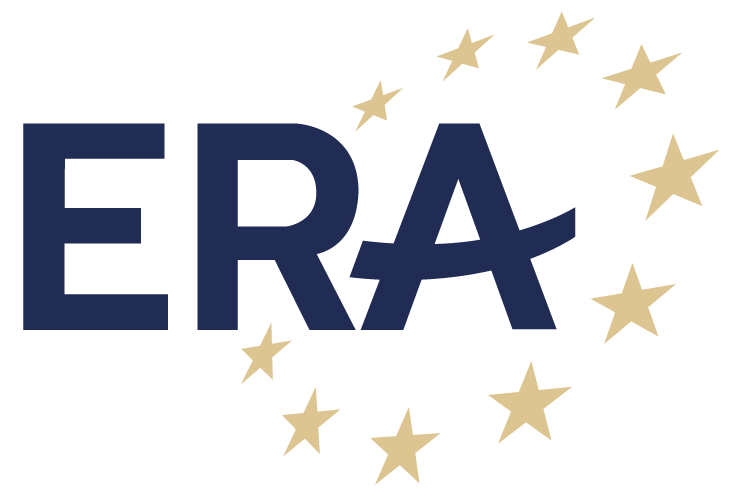Annual Report
2023

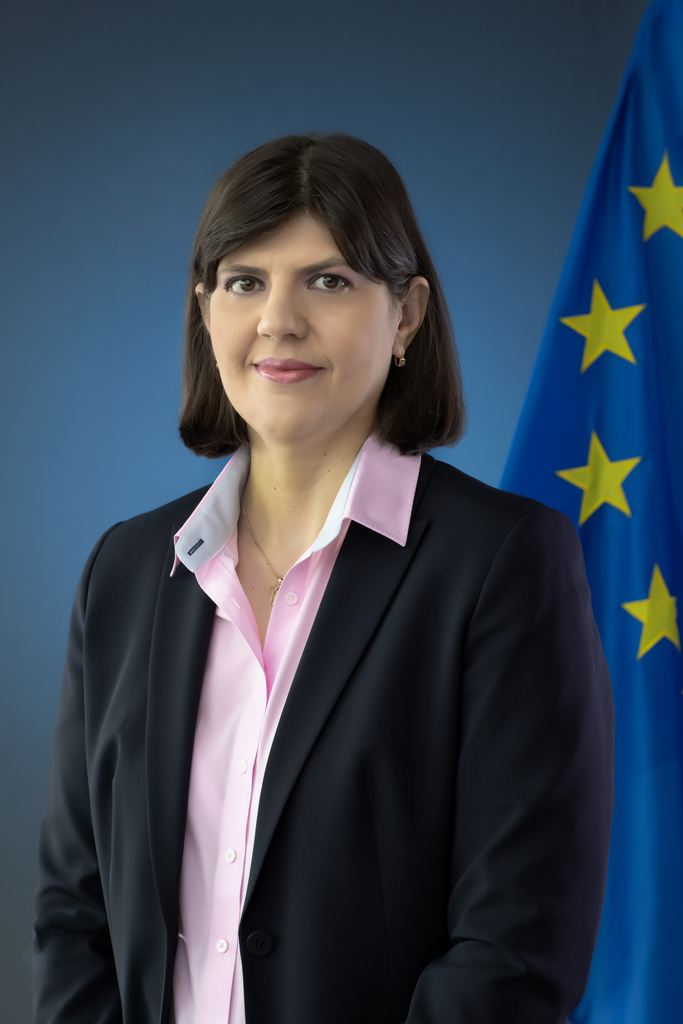
Preface
Laura Kövesi
European Chief Prosecutor European Public Prosecutor's Office (EPPO)
The latest Annual Report of the EPPO shows that, at the end of 2023, we had a total of 1,927 active investigations, with an overall estimated damage to the EU budget of €19.2 billion. More than half of it was linked to serious, cross-border VAT fraud. This type of fraud often involves sophisticated criminal organisations, and is nearly impossible to uncover in a purely national investigation. In 2023 we saw a significant increase of crime reports – from private parties as well as from national authorities. This evolution proves that the level of detection of fraud affecting the financial interests of the EU in the participating Member States is improving.
In 2023 we opened 1,371 investigations, which is 58% more than in 2022 – corresponding to damage estimated at €12.28 billion. This is mostly the result of the combination of improved cooperation between the EPPO and the relevant national authorities, and the EPPO’s determination to target criminal organisations particularly active in subsidy fraud (non-procurement expenditure fraud) and revenue fraud (VAT and customs). In 2023, judges granted freezing orders worth €1.5 billion in relation to EPPO investigations, which is over four times more than in 2022.
However, this is still only a fraction of the illicit profits of criminal networks, which could exceed hundreds of billions annually, according to recent estimates. You might remember Giovanni Falcone for his famous motto, ‘follow the money’. The EPPO makes it possible to go one step further, and ‘focus on the money’. If we want to seriously affect criminals’ ability to operate, let alone grow and expand their activities, we must take white-collar criminals out of the equation. Our strategy should be to cripple the financial capacity of the serious organised crime groups.
With this objective in mind, training of the European Delegated Prosecutors, law enforcement officers, tax investigators, customs officials, judges and lawyers is key. This is why the Academy of European Law (ERA) is an essential partner for the EPPO.
Let me focus on law enforcement officers, who constitute one of ERA’s important target groups. In September 2023, together with the Italian Guardia di Finanza, we launched the “EPPO Academy”. To fight against serious financial crime efficiently, the EPPO needs the support of dedicated and specialised investigators in all the participating Member States. Currently, in the European Union, there is a significant room for improvement when it comes to experience in investigations into financial and economic crimes in general, and crimes affecting the EU budget in particular.
Our objective is to give any law enforcement officer working on EPPO cases the opportunity to learn from the best in any field relevant to the EPPO’s competence. This can of course only be done with the help of our partners such as ERA.
ERA has accompanied the EPPO from the very beginning, when it was only a Commission legislative proposal. Since 2013, it has been organising conferences, on-site training and e-learning courses on topics related to the EPPO’s competences and on the EPPO itself. Furthermore, for the last ten years, the development of the EPPO formed part of ERA’s annual conferences on European criminal law, summer courses on European criminal justice, annual conferences on white-collar crime and seminars on anti-money laundering for the judiciary and law enforcement.
In 2023, in a consortium with the EJTN, ERA implemented 14 online training events for EPPO staff. ERA hosted a seminar training judges and prosecutors on the EPPO’s operational framework, investigations and prosecutions with the EPPO. For the first time in 2023, ERA conducted a study visit to the EPPO in the framework of a training for law enforcement officers, prosecutors and judges from the EU and third countries.
We are grateful for this support, which will become even more important in the upcoming years.

Jean-Claude JUNCKER
Former President of the European Commission
President of the ERA Governing Board
"In November 2023, the Republic of Albania became a full member of ERA, which I consider an important step towards European integration. By signing the accession agreement to ERA, the Ministry of Justice has created a suitable environment for training and exchange of experience within the framework of ERA. It is hoped that this membership will lead to enhanced legal harmonisation with EU standards, better preparation for EU accession and increase legal expertise for the enforcement and good application of EU law in Albania. I would like to thank all the ERA patrons for their decision. I hope that the other countries of the Western Balkans will join ERA in the coming months, because their place is in Europe and therefore with us."
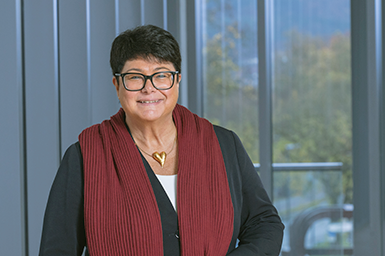
Sabine VERHEYEN MEP
Chair of the European Parliament Committee on Education and Culture
Chair of the ERA Executive Board
"Over the last few years, I have seen the Academy rightly rethink its training offer by making greater use of digital technologies and integrating them into its education system by design. I am therefore very pleased that the European Parliament approved the European Commission’s proposal to increase the operating grant that ERA receives under the Jean Monnet Actions for 2023. Indeed, the Academy is one of only six institutions that "pursue an aim of European interest", which is explicitly mentioned in the Erasmus+ Regulation. In 2023, this increased funding was used to implement key strategic objectives, in particular for the younger generation, the Western Balkans and Ukraine. ERA’s role in Europe for a better application and understanding of EU law among legal practitioners is paramount."

Marc VAN DER WOUDE
President of the General Court of the European Union
Chair of the ERA Board of Trustees
"The Board of Trustees has two main functions for ERA. Internally, it provides advice and support on strategy and programmes. Its role is also to challenge the Management Board and staff by providing critical feedback. Externally, Board members should be seen as ambassadors of the organisation, promoting ERA and its activities wherever and whenever appropriate. The Board’s term of office, which ended in 2023, was complicated by the pandemic, so much of the work had to be done online. Nevertheless, members have been able to follow and support the profound changes in the ERA programme in recent years, both in terms of content and methodology. I am grateful to the outgoing Board of Trustees for its valuable commitment to this unique and truly European training institute."
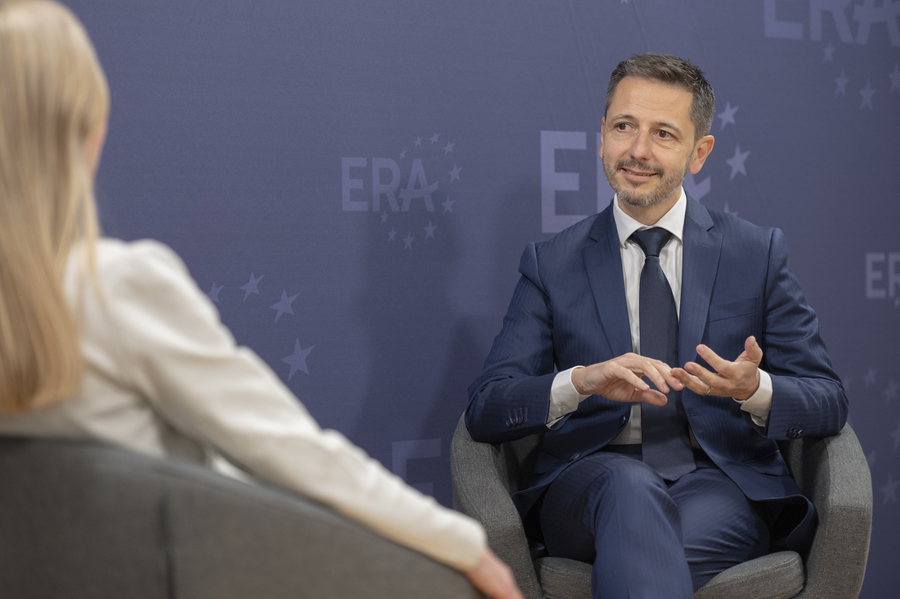
Jean-Philippe Rageade
Director of the Academy
Interview
with the director
1
What were the highlights of ERA’s activities in 2023?
In 2023, over 8,600 legal practitioners attended our training programmes – not counting the number of users of our e-learning courses or other online resources available on our website.
The very high success rate of our applications for EU-funded training projects in 2023 is another source of satisfaction, confirming ERA's competitiveness in the field. For example, the Academy was awarded another four-year service contract to continue its important work in the field of anti-discrimination and gender equality law. Other service contracts were won in the field of EU environmental law as well as in an area of law hitherto largely unexplored by ERA, namely investment protection. It is also worth mentioning an original project newly awarded by the EU that will support the creation of a network of judges and prosecutors as experts in EU law in the Baltic States. I would like to take this opportunity to thank the numerous national judicial training institutes and the European Judicial Training Network (EJTN) for their support in applying for and implementing these EU-funded projects.
In terms of programmatic innovation, if I had to pick just one, it would be the European Patent Litigation Certificate (EPLC). This training course running over several months is aimed at patent attorneys wishing to appear before the recently created Unified Patent Court (UPC). Developed in collaboration with Maastricht University, this course was accredited by decision of the Administrative Committee of the UPC in April 2023. The EPLC should be seen for ERA as a first response – albeit on a niche topic – to the growing trend for practitioners to seek certified qualifications through long-term professional training programmes. Based on the success of this initial trial, we are considering expanding the offer of certification and academic qualification to other programmes and to other audiences from 2024 onwards.
As regards the target groups, some 1,350 lawyers in private practice attended our training events in 2023. 30% more participated in our open events than the previous year. These good figures confirm that strategic partnerships with local and national bar associations – also important in the context of EU-funded projects –, as well as recent initiatives such as the European Forum of Legal Professions, have given us renewed visibility with this traditional ERA target group, including its younger generation.
2
Speaking of the younger generation – ERA’s development strategy puts a lot of emphasis on them. Has any notable progress been made?
Under young(er) generation you have to distinguish between young professionals and students. Both groups are of course relevant to ERA, but not to the same extent.
More recently, one of the first major projects dedicated to this target group was the Young European Lawyers Contest (YELC), which ERA launched in cooperation with the CCBE in 2018. Since then, YELC has grown in size and complexity. It is now supported by many national/local bar associations, includes three semi-finals in different countries and the final at the General Court of the EU. In 2023, the contest was complemented by another major project, the Young European Lawyers Academy (YELA), a series of two-week intensive training programmes on European law in Trier, with study visits to the European courts in Luxembourg and Strasbourg. Also co-funded by the EU, it brings together various national bar associations and the European Young Bar Association.
Moreover, the Friends of ERA Association launched a “Young Friends of ERA” network in 2023, initially targeting the “alumni” of the above-mentioned Young European Lawyers projects and former beneficiaries of the scholarship programmes. This newly created network aims to involve young practitioners in the Association’s national chapters, giving them the opportunity to network with more senior lawyers. First activities are expected from early 2024 on.
While it remains important for the Academy to maintain its focus on practitioners, we also discussed at the Board of Trustees meeting in September 2023 the need for ERA to respond to the demand from (especially advanced) law students to participate in its programmes. Possible initiatives were addressed, such as a dedicated scholarship programme – requiring additional fundraising – that could be developed in cooperation with the European Law Students Association (ELSA) to allow a limited number of students each year to participate in selected courses or seminars. Our Development Strategy also envisages developing cooperation with the Jean Monnet university chairs, modules and centres of excellence, which represent the leading higher education institutions in the field of European law. Some progress in this area is expected in 2024.
For ERA, all these projects aimed at the young(er) generation are a crucial investment in the long term and therefore a clear priority.
3
Another of ERA’s priorities has been to help the Western Balkan countries prepare for future EU membership. Is Albania’s accession to the ERA Foundation the first major achievement of this objective?
Albania's accession to our Foundation is undoubtedly our institutional highlight for 2023. We are very pleased with this enlargement, both because it is the first country from the Western Balkans to join ERA and because it had been a few years since our foundation last expanded – the last country to join us was Estonia in 2018.
Having said that, Albania's accession is just the tip of the iceberg when you consider that our Academy has carried out in-depth groundwork with the legal and judicial stakeholders in the Western Balkans over the past year, with numerous projects launched, the volume and intensity of which should reach a crescendo in 2024.
2023 was the year in which ERA began to establish itself in the region. In May last year, the Friends of ERA co-funded a joint study visit to ERA and the European Court of Justice for the directors of the judicial training institutes and the presidents of the bar associations of all six Western Balkan countries. This study visit enabled us to discuss in depth the needs and expectations for training of legal professionals in EU law in the region and to develop with them a comprehensive training strategy for the coming years. Shortly afterwards, training initiatives were launched, notably with the Albanian and Serbian judicial training institutes, and framework agreements were signed with certain national regulators, notably in the field of competition law.
As a result, more than 300 legal practitioners from these countries took part in ERA training programmes, almost four times more than in the year before. In addition, for the first time, our Governing Board appointed two individuals from the Western Balkans to the Board of Trustees for the term of office 2024-2027, cementing our relations with the region.
At the same time, the Friends of ERA, at the members’ meeting of September 2023, gave its go-ahead for the creation of a Fund for the Western Balkans, as well as Ukraine and Moldova. This fund will support study visits to our headquarters in Trier and to the EU institutions for those responsible for training the legal professions in these countries. It will also provide training programmes tailored to the needs of legal practitioners in these countries, to be delivered locally and, where appropriate, in local languages. A first fundraising campaign will be launched in the first quarter of 2024.
All in all, the strategic objective of broadening the geographical scope of our activities to the candidate countries is strongly supported by our institutional bodies.
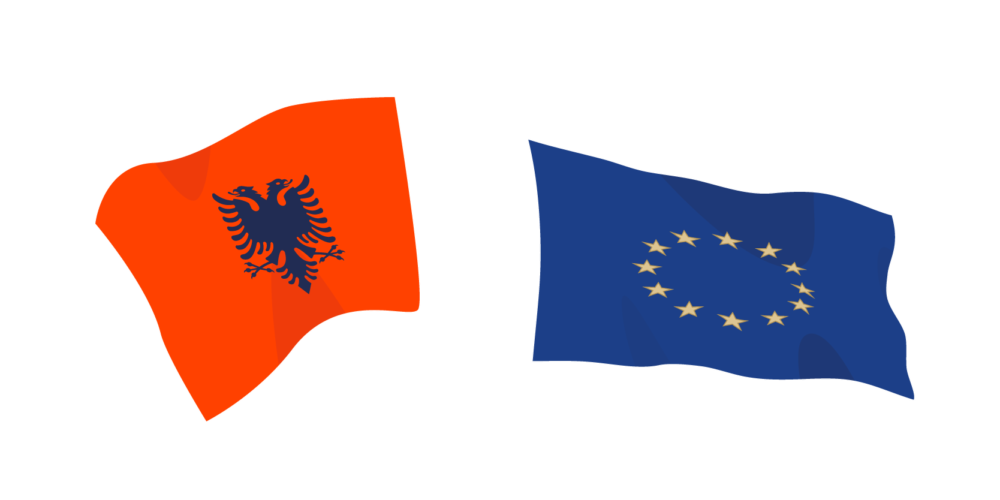
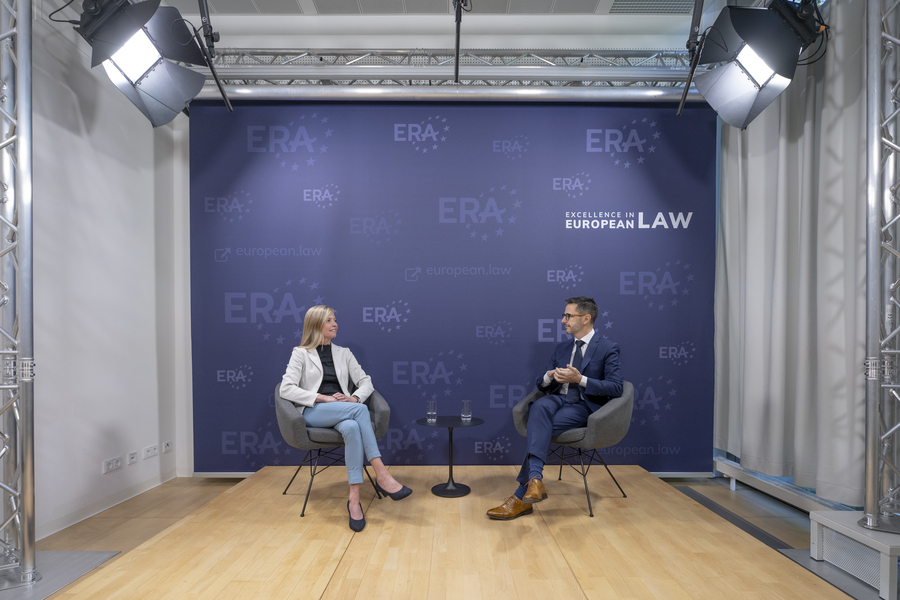
4
What are the major challenges that ERA has faced in recent years?
There are, of course, many. Most of those that were identified in our Development Strategy for 2021-2027 remain valid and have kept us busy. This is the case, for example, with the "Green ERA" strategy, for which we received EMAS certification for environmental management and environmental auditing at the end of 2021.
I would, however, like to focus on two other challenges for ERA.
The first is digitalisation. In recent years, digitalisation, which is also a major challenge for our target groups, has been increasingly integrated into our training programmes, both in terms of topics (AI, cybercrime, data protection etc.) and methodology. Through its involvement in EJTN activities, ERA has been able to learn from and share its own best practices with other judicial training actors in this field. In parallel, a strategically and financially significant investment was also made in our conference centre, which was completed at the beginning of 2023, in order to modernise it: the conversion of our conference and interpretation technology from analogue to digital, as well as the purchase of modern laptops and large screen walls to ensure an immersive hybrid experience for our participants, have allowed us to maintain a high level of attendance at our events. In 2023, ERA also worked on converting a room into a fully equipped film studio to improve the quality of recordings and webinars and enhance its online offering. The new studio is expected to be fully operational in the first quarter of 2024. The innovative feature of this project – developed in collaboration with an audiovisual engineering company – will be the combination of a film studio and a fully-fledged mobile conference system, allowing ERA to hold hybrid events outside of Trier and in full autonomy. In the last two years, ERA has also renewed and expanded its range of e-learning courses, with the aim of providing a reference for practitioners in search of knowledge when they need it and an introduction to more interactive forms of training programmes. The catalogue of e-presentations as side-products of our training events, which has been continuously enlarged, packaged and promoted as thematic or general subscriptions, is now available on the online platform of the renowned legal publishing company VLEX. Despite all these encouraging developments, there are still two big issues that ERA needs to address as its next priorities. The first is the launch of a new website, a project that has been in the pipeline for far too long, and which could not be successfully completed in 2023 as planned. The second need for immediate action concerns the digitalisation of ERA's departments, notably finance and human resources, as well as the acquisition of modern software to support our marketing and sales activities, and finally the increased use of artificial intelligence in our work processes.
The other major challenge relates to the most important asset of ERA: its human resources. ERA has recently seen several staff members who had contributed greatly to its achievements leave the organisation for age reasons. This trend is expected to peak within the next 10 years, when almost a quarter of the current employees – including some in key positions and therefore critical to the success and growth of the Academy – will retire. ERA needs to pre-empt the risk of a significant loss of experience, know-how and culture through early knowledge transfer and a structured succession plan. The current age pyramid of the staff shows a dominance of mid-career employees and therefore a mature and experienced workforce that is valuable for stability and expertise. At the same time, the fact that only 8% of employees are under the age of 35 suggests a potential gap in attracting and retaining young talent. This may also pose challenges in terms of diversity, digital skills and adaptability to new technologies. Since the end of the pandemic, we, like many other economic actors in the region, have struggled to replace retiring colleagues quickly enough, particularly in positions with technical backgrounds. While Trier is a charming city, it faces fierce competition with larger cities in Germany and with neighbouring countries, especially Luxembourg with higher salaries, lower tax rates and a wide range of benefits when it comes to attracting and retaining top talent. For many years, ERA's reputation has – rightly – been focused on its role as a provider of high-quality training programmes rather than as an attractive employer, although the average length of service of 13 years of its staff, which is high for both the region and the size of the organisation, should speak for itself. It is now time for ERA to sharpen and strengthen its profile as an employer in order to continue to attract and retain good and qualified people in all its departments. This employer branding strategy is key to ERA's future, as it will serve its goal of continuing to provide top-notch education in the digital landscape.
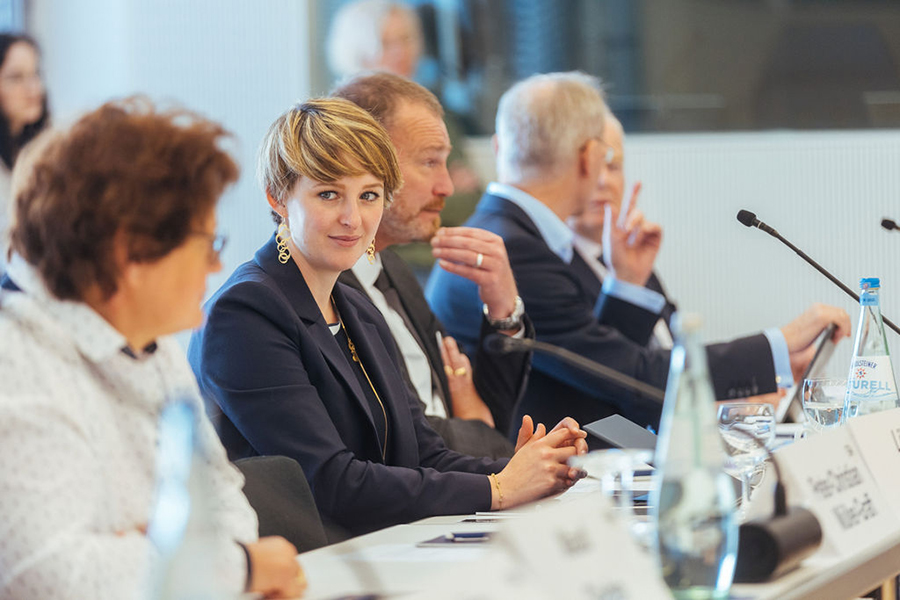
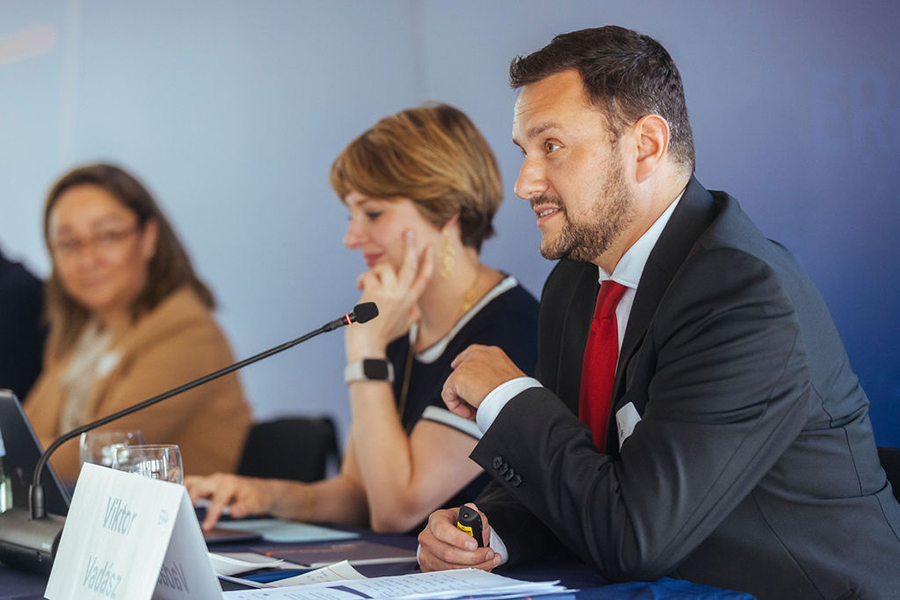

5
ERA’s departmental structure underwent a major overhaul in 2023, particularly at Management Board level. Was this change in the organisational chart motivated by the need to respond more effectively to the challenges you mentioned?
That is indeed the case. Until the end of 2022, ERA's administrative structure was divided into three departments, each responsible for different aspects of the implementation of its activities: the Programme Department, the Corporate Communications Department, and the Finance and Conference Services Department. Each department was headed by a Director, who was also the Deputy Director of ERA and a member of the Management Board.
I am thus grateful to the Governing Board that supported my decision to partly reorganise our departmental structure and lines of responsibility according to which “Finance” and “Conference Services” would be managed separately from 2023. The other part of this internal reorganisation was that the Finance Department – to which would be added the Human Resources Department – would continue to be headed by its own director, who would also be deputy director and member of the Management Board. The "Conference Services" area would then form a (new) fourth department comprising "Facilities, Infrastructure & Conference Services" and would be headed by a General Manager, a position that Luc Doeve took up on 1 January 2023. This reorganisation helps to explain Luc and his team's rapid progress in upgrading our facilities last year.
In July 2023, ERA recruited Lilian Erbel for the newly created position of Director of Finance and Human Resources. Before joining the team, Lilian was commercial director of the Mosel Musikfestival gGmbH. She brings the expertise we were looking for, as well as a passion and a very good understanding of new technologies and digital issues. She will be the driving force in ensuring internal digitalisation, improving our financial controlling, strengthening our employer brand and relaunching the website project that is at a standstill. At its meeting in November 2023, the Governing Board decided to appoint Lilian Erbel to the Management Board with effect from 1 January 2024.
Finally, another major change took place, as ERA's long-serving Director of Corporate Communications and Deputy Director, John Coughlan, decided to leave the Academy at the end of 2023 to take up the post of Secretary General of the International Cerebral Palsy Society. The entire ERA team is grateful to John who played a key role in the development of ERA in general and as a member of the Management Board for 15 years in particular. We will be looking for a qualified replacement in 2024.
